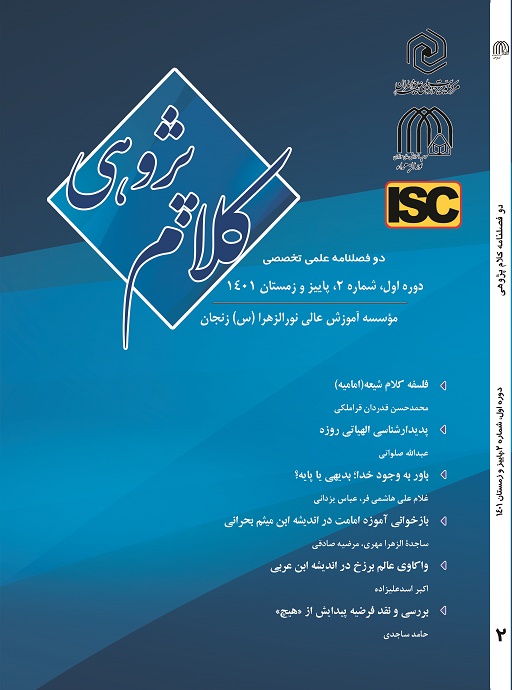نوع مقاله : مقاله پژوهشی
نویسنده
استاد کلام پژوهشگاه فرهنگ و اندیشه اسلامی قم
چکیده
مقاله حاضر نگاه بیرونی به علم کلام اسلامی- شیعی دارد که در آن علم کلام و مسایل آن به صورت کلی و از منظر داور بیرونی مورد تحلیل قرار می گیرد. علم کلام شیعی علمی است که به تبیین آموزه های اعتقادی، تدوین و پاسخ شبهات آن با منابع خاص خود (کتاب، سنت نبوی و ولوی، عقل) می پردازد. موضوع آن عام بوده و شامل تمام آموزه های اعتقادی می شود که ملاک آن بیشتر برگشت به وجود، صفات و افعال خدا (اعم از فعل گفتاری یا تکوینی) است. در این مقاله بعد از اشاره به خاستگاه کلام شیعی از آغاز دعوت اسلام توسط پیامبر(ص) با «حدیث الدار» و استمرار آن توسط امامان، هدف آن علم افزون بر تبیین آموزه های اعتقادی اسلام، تبیین و دفاع از مبانی و آموزه های خاص تشیع یعنی«اصل امامت» توصیف شده است. کلام شیعی با روش ترکیبی(نقلی، عقلی، جدلی، تجربی، شهودی و فطری) و با استناد به قواعد متعدد کلامی به تبیین آموزه های اعتقادی می پردازد. رابطه علم کلام شیعی با علوم مختلف (منطق، معرفت شناسى، فلسفه، اصول فقه، فقه، علوم تجربی) رابطه متقابل (تاثیر و تاثر) است. مقاله حاضر، ضمن بیان هویت معرفتی کلام شیعی، به جایگاه، ساختار منطقی، تبیین مسائل کلاسیک و جدید و تبیین حوزههای پیشنیاز، همنیاز و پسنیاز آن میپردازد.
کلیدواژهها
عنوان مقاله [English]
The Philosophy of Shi'i Theology
نویسنده [English]
- mohammad hasan gadrdan
استاد کلام پژوهشگاه فرهنگ و اندیشه اسلامی قم
چکیده [English]
This article has an external view of Islamic-Shia theology which theology and its issues are analyzed in general and from the perspective of an external judge. Shia theology is a science that explains religious doctrines, compiles and answers its doubts with its own sources (Qur'an, Prophetic and guarding )walvi (sunnah, reason). Its subject was general and it includes all religious doctrines, the criterion of which is mostly its return to God's existence, attributes, and actions (whether verbal or generative). First of all, this article refers to the origin of the Shia religion from the beginning of the call to Islam, with regard to the hadith of al-Dar, which the imams have also continued on this matter hen, while defending the religious teachings of Islam, the foundations and special teachings of Shiism (principles of the Imams) have been defended. Shi'ite theology explains religious doctrines with a combined method (narrative, rational, dialectician, experimental, intuitive and natural) and by referring to numerous theological rules. The relationship between Shiite theology and various sciences (logic, epistemology, philosophy, principles of jurisprudence, jurisprudence, experimental sciences) is a mutual relationship (effect and impression). The present article, while expressing the epistemological identity of the Shiite word, deals with its position, logical structure, explanation of classical and new issues, and explanation of its prerequisite, co-requisite and post-requisite areas.
کلیدواژهها [English]
- Shi'i theology
- Emamiyeh
- Philosophy of theology
- The subject of Shi'i theology
- The rules of Shi'i theology

